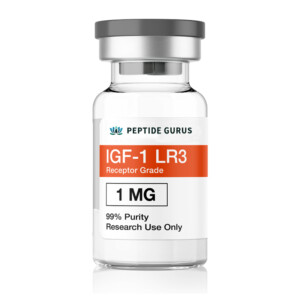IGF-1 LR3 receptor grade peptide is a highly significant reagent in the field of scientific research. This article will delve into its properties, applications, and how its use aligns with the latest FDA guidelines.
IGF-1 LR3, also known as Long R3 IGF-1, is a modified form of insulin – like growth factor – 1. The receptor grade version of IGF-1 LR3 stands out for its exceptional biological activity. It has a stronger affinity for the IGF receptor compared to regular IGF-1 and Media Grade IGF-1 LR3. This enhanced affinity leads to a more potent effect in in – vitro studies. For example, when used in mammalian cell cultures, supplementing with a lower concentration of Long R3 IGF-1 can result in a more significant increase in productivity compared to standard concentrations of insulin and/or standard IGF-1.
One of the key aspects of IGF-1 LR3 receptor grade peptide is its role in cell growth studies. It can effectively stimulate the type 1 IGF receptor. This stimulation triggers a series of intracellular events, including increased intracellular signaling, cell proliferation, and inhibition of apoptosis. These effects are crucial for understanding how cells grow, develop, and respond to various stimuli. In muscle cells, IGF-1 LR3 plays a multi – faceted role. It encourages hyperplasia, which means an increase in the number of muscle cells. It also has a positive impact on the lifespan of satellite cells in skeletal muscle. By increasing the lifespan of these satellite cells, it helps to increase their number within muscle tissue. Additionally, it promotes the differentiation of myoblasts, converting stem cell progeny into dedicated muscle tissue, thus accelerating muscle development.
Another important property of IGF-1 LR3 is its resistance to IGFBP – binding. This characteristic allows it to remain active in the bloodstream for a longer time compared to IGF-1. As a result, smaller amounts of IGF-1 LR3 can be used to achieve the same effects as larger doses of IGF-1. Some IGF-1 derivatives, like the GPE derivative, have shown potential therapeutic effects in neurological injuries such as stroke. Although most of these studies have been conducted in non – human animal models or cell cultures, they still provide valuable insights into the potential applications of IGF-1 LR3 and its derivatives.

When it comes to research use, it is essential to comply with the latest FDA guidelines. The FDA regulates the use of research chemicals to ensure safety and ethical practices. For IGF-1 LR3 receptor grade peptide, it is mainly intended for in – vitro research purposes. This means it should be used in laboratory settings for experiments such as cell culture studies, receptor – binding assays, and investigations into its effects on various biological processes. It is strictly prohibited to use this peptide for human consumption or in clinical trials without proper authorization from the FDA.
In cell culture studies, researchers can use IGF-1 LR3 receptor grade peptide to explore how it affects different cell types. For instance, in cancer research, understanding its interaction with the IGF-1 receptor, which has been implicated in several types of cancer including breast, prostate, and lung cancer, can provide insights into tumor growth and potential treatment strategies. In addition, its role in metabolism research is also significant. Since IGF-1 LR3 can bind to the insulin receptor and affect glucose uptake, studying its effects can contribute to a better understanding of metabolic disorders such as diabetes.
However, it is important to note that while IGF-1 LR3 receptor grade peptide offers great potential in research, there are also some considerations. Side effects in research models, although not fully understood in the context of human use, may include potential impacts on cell growth regulation that could lead to abnormal cell behavior if not carefully studied. Also, the long – term effects of exposure to this peptide in in – vitro systems are still being investigated.
Question: Can IGF-1 LR3 receptor grade peptide be used for improving my muscle strength in daily life?
Answer: No, IGF-1 LR3 receptor grade peptide is only for research use. It is not approved for human consumption or use in enhancing muscle strength in daily life. Using it without proper authorization is illegal and may have unknown health risks.
Question: How is the purity of IGF-1 LR3 receptor grade peptide ensured?
Answer: Reputable suppliers like ours use advanced analytical techniques to test the purity of IGF-1 LR3 receptor grade peptide. We conduct strict quality control measures to ensure that the product has a purity of 99%, which is crucial for accurate and reliable research results.
Question: Are there any alternatives to IGF-1 LR3 receptor grade peptide for cell growth studies?
Answer: Yes, there are alternatives such as regular IGF-1 and Media Grade IGF-1 LR3. However, IGF-1 LR3 receptor grade peptide is more potent in in – vitro studies due to its higher biological activity, making it a preferred choice for certain types of research where maximum effectiveness is required.
PeptideGurus is a leading supplier of American-made research peptides, offering top-quality products at competitive prices. With a focus on excellence and customer service, they ensure a secure and convenient ordering process with global shipping.
CONTACT